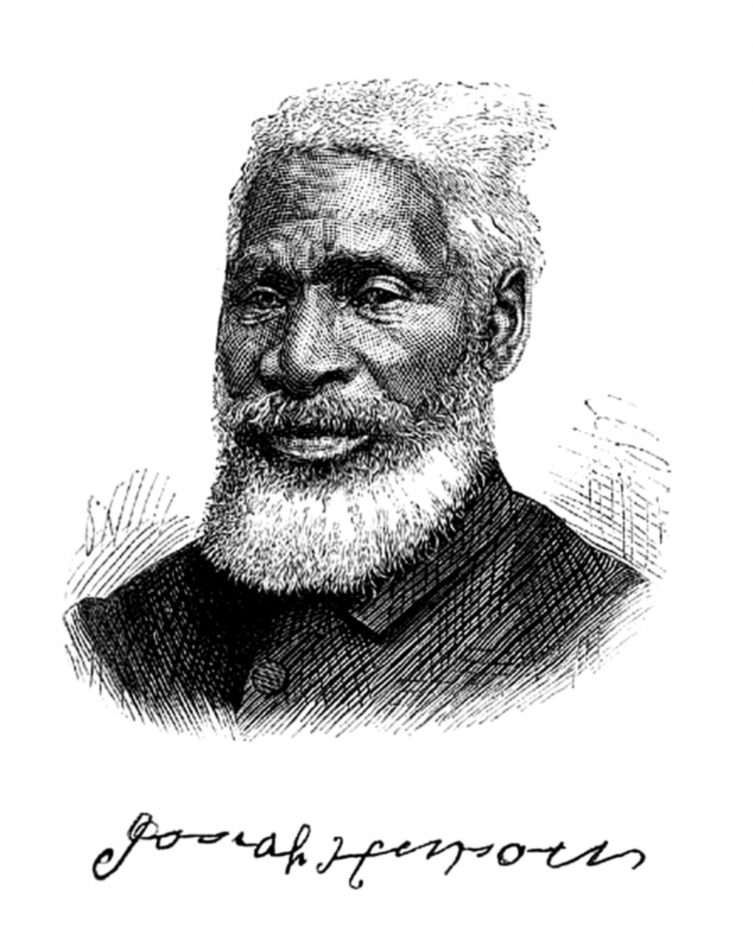The Rev. Josiah Henson is coming into his own – albeit more than a century posthumously. Montgomery Parks (MP) is honoring the memory of the preacher, author and abolitionist by publishing a comprehensive biography and planning a brand-new museum scheduled to open in the summer of 2020.
The local tie to the man whose autobiography allegedly inspired Harriet Beecher Stowe’s 1852 novel “Uncle Tom’s Cabin” is substantial. Rev. Henson was a slave on a plantation just off Old Georgetown Road at what is now Josiah Henson Park before he escaped to Canada and founded a settlement and school for fugitive slaves,
MP’s Senior Historian Jamie F. Kuhns spent 10 years researching and writing the book, “Sharp Flashes of Lightning Come from Black Clouds: The Life of Josiah Henson.” She based the 204-page illustrated tome on Henson’s 1849 autobiography, subsequent editions and archival materials.
The biography is part of MP’s Cultural Resources and Stewardship section’s effort to create the Josiah Henson Park Museum & Education Center. Kuhns’ research constitutes the basis for its exhibits and programming. According to MP Museum Manager Shirl Spicer, the new museum will “complete a trilogy of historic sites within MP that focus on the historical African American experience in Montgomery County and Maryland. It provides an opportunity for visitors to learn of the county’s enslaved population through the lens of a Maryland native son.”

“This compliments our other sites,” Spicer added, referring to “Woodlawn Manor Cultural Park and its Underground Railroad Experience Trail that shape the experience of resistance to slavery via escape to freedom, and Oakley Cabin African American Museum that offers examples into life for 19th century African American communities following the end of the Civil War through living history demonstrations and experiences.”
After buying the Riley/Bolten house and a 1.43 acre section of land in 2006, MP “developed a strategic plan for cultural resources”… Telling the (story of the) life of Rev. Josiah Henson at this venue was deemed of prime importance,” Kuhns said.
That goal defined Kuhns’ job, which was, she explained, “to conduct all the research necessary to give docent-led tours at the Riley/Bolten House and ultimately to create exhibits for the future Josiah Henson Museum.” She began with eight editions of Henson’s narratives that were published between 1849 and 1890, then used “archival investigation to address the practice of slavery as Henson experienced it first-hand in Montgomery County, Maryland and the Upper South, and to further enhance our understanding of his extraordinary achievements as a freedman in Canada.”
A striking realization occurred at the start of her research. “The one thing I will never forget was finding Josiah Henson’s manumission/freedom paper included in the Montgomery County Land Records at the Maryland State Archives,” Kuhns said. “In a very tangible way, it shows that until 1864 in Maryland, enslaved people were considered no different from acreage, livestock or furnishings – they were identified as property. Families were separated and destroyed to pay debts or to ensure a form of inheritance. It is painfully hard to imagine in a democratic society how this situation was ever considered acceptable.”
When Kuhns completed her research, she and the exhibit design team “recognized that much of that information couldn’t be conveyed in the museum content, but needed to be dispersed to the public.” They concluded that the book would become “ the means to accomplish that objective: to get people excited about Henson’s story and to build anticipation for the new museum in his honor. The book is, essentially, a sneak peek at what patrons can expect when it opens in 2020.”
Kuhns became familiar with Henson’s story in 2004 while concurrently working on a doctorate in History of American Civilization at the University of Delaware and a traveling exhibit about the Underground Railroad for the Delaware Historical Society. She proceeded to read “Uncle Tom’s Cabin,” and “The Key to Uncle Tom’s Cabin,” which identified the historical sources for the characters, including said Kuhns, “Henson as an inspiration for Uncle Tom.”
It was a natural fit for Kuhns’ new position with MP. By that time, 2008, “M-NCPPC had already identified the Josiah Henson Park … as one of the primary cultural resources warranting extensive research and public interpretation for use as a museum,” she said.

While the book, said the author, “is academic in its approach and presentation, (it is) accessible” and contains “a wide range of visuals, from maps to illustrations from Henson’s 1879 edition, to every known photo of Josiah Henson I could find.”
Her challenge, Kuhns said was “not to overshadow or dilute the power of Henson’s own storytelling. I want people to be captivated by his recollections, so I extensively pulled quotes from his narrative. I also wanted to give readers the ability to understand his years of enslavement and achievements as a free man.”
For the title, Kuhns quoted from Henson’s narrative, intending that it “solidify the importance of his words and his memories of his enslavement. This particular quote addresses how Henson still produced ‘sprightly words of wit’ despite the objections of Isaac Riley in allowing Henson to learn to read and write.”
Spicer is pleased with Kuhns’ book. “I’m really proud of the work that Jamie’s done in producing this definitive biography, and so happy that the public will have this opportunity to glimpse the depth of research she undertook to help in the development of the new museum’s interpretive exhibits. ‘Sharp Flashes of Lightning’ more than met my expectations in both its content – which was well-balanced between the historical background of Henson’s life and his achievements and struggles, as well as its visual layout.”
The author, too, has high hopes. “I expect both the book and the museum will elevate Josiah Henson to his rightful place in history,” she said.
Books are available for $39.99 at www.MontgomeryParks.org